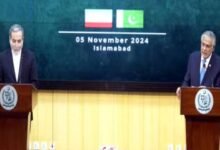Foreign direct investment into India has slumped in the past year, despite investors turning bullish on the world’s fastest-growing major economy.
Net foreign investment in the year through September fell to $13 billion, according to calculations from HSBC Holdings Plc, down from $38 billion in the same period a year earlier. The figure was at a recent high of $44 billion during India’s 2021 fiscal year, which ends in March.
The pullback comes despite a wave of planned investments announced by foreign companies and investment funds. They include projects from semiconductor plants spearheaded by American firms to multibillion-dollar renewable energy projects drawing interest from Gulf countries.
The FDI figures line up with the trend from official balance of payments data released by the Reserve Bank of India. The latest statement showed net FDI inflows fell to $4.8 billion in the first half of the fiscal year (April to September last year), compared with $19.6 billion in the same period a year earlier.
The slump in FDI was confounding, HSBC said, given the economy’s rapid growth and increasing share in global trade. The government expects gross domestic product will grow 7.3% in the fiscal year ending in March, matching the pace last year.
In explaining last year’s FDI drop, HSBC said it reflects a shift in investor appetite rather than a loss of interest in the Indian economy. One factor is the falling investment in Indian tech start-ups, mirroring a global trend, the bank’s economists said in a Thursday report.
Another factor: declining investment in so-called physical sectors, which includes automobiles, pharmaceuticals and construction. But many investors have signaled recent commitments to invest in emerging sectors, like artificial intelligence, data centers and electric vehicles, the bank said, a sign that investor appetite is shifting to new frontiers.
“Being new, these sectors may take more time than normal to materialize,” HSBC economists wrote. “And when they do, a new wave of FDI will likely come in.”
At an event on Thursday, Reserve Bank of India governor Shaktikanta Das acknowledged the fall in FDI into India recently, but said the decline tracks a pull-back globally.
“I think these are the points which are being missed out,” Das said.
Net foreign investment in the year through September fell to $13 billion, according to calculations from HSBC Holdings Plc, down from $38 billion in the same period a year earlier. The figure was at a recent high of $44 billion during India’s 2021 fiscal year, which ends in March.
The pullback comes despite a wave of planned investments announced by foreign companies and investment funds. They include projects from semiconductor plants spearheaded by American firms to multibillion-dollar renewable energy projects drawing interest from Gulf countries.
The FDI figures line up with the trend from official balance of payments data released by the Reserve Bank of India. The latest statement showed net FDI inflows fell to $4.8 billion in the first half of the fiscal year (April to September last year), compared with $19.6 billion in the same period a year earlier.
The slump in FDI was confounding, HSBC said, given the economy’s rapid growth and increasing share in global trade. The government expects gross domestic product will grow 7.3% in the fiscal year ending in March, matching the pace last year.
In explaining last year’s FDI drop, HSBC said it reflects a shift in investor appetite rather than a loss of interest in the Indian economy. One factor is the falling investment in Indian tech start-ups, mirroring a global trend, the bank’s economists said in a Thursday report.
Another factor: declining investment in so-called physical sectors, which includes automobiles, pharmaceuticals and construction. But many investors have signaled recent commitments to invest in emerging sectors, like artificial intelligence, data centers and electric vehicles, the bank said, a sign that investor appetite is shifting to new frontiers.
“Being new, these sectors may take more time than normal to materialize,” HSBC economists wrote. “And when they do, a new wave of FDI will likely come in.”
At an event on Thursday, Reserve Bank of India governor Shaktikanta Das acknowledged the fall in FDI into India recently, but said the decline tracks a pull-back globally.
“I think these are the points which are being missed out,” Das said.






